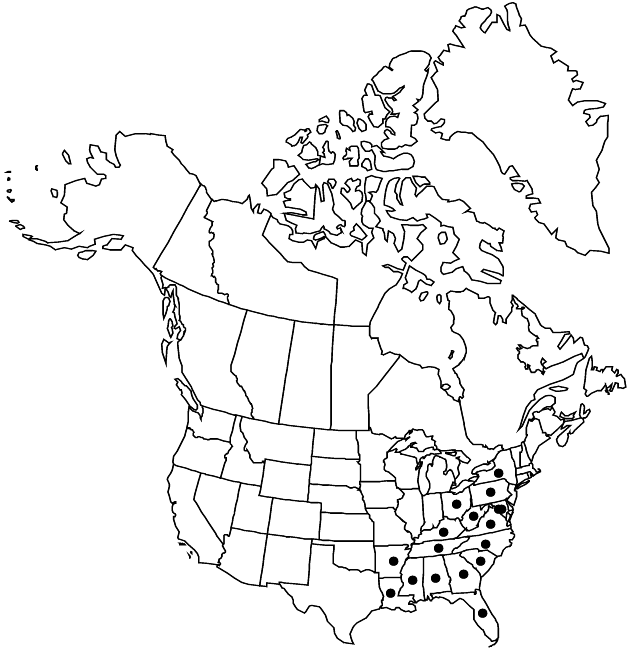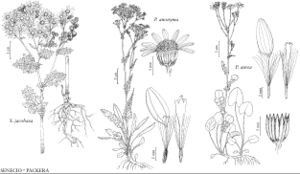Difference between revisions of "Packera anonyma"
Phytologia 49: 45. 1981.
FNA>Volume Importer |
FNA>Volume Importer |
||
| Line 15: | Line 15: | ||
|name=Senecio aureus var. angustifolius | |name=Senecio aureus var. angustifolius | ||
|authority=Britton | |authority=Britton | ||
| − | }}{{Treatment/ID/Synonym | + | }} {{Treatment/ID/Synonym |
|name=Senecio earlei | |name=Senecio earlei | ||
|authority=Small | |authority=Small | ||
| − | }}{{Treatment/ID/Synonym | + | }} {{Treatment/ID/Synonym |
|name=Senecio smallii | |name=Senecio smallii | ||
|authority=Britton | |authority=Britton | ||
| Line 36: | Line 36: | ||
|elevation=50–1800 m | |elevation=50–1800 m | ||
|distribution=Ala.;Ark.;D.C.;Fla.;Ga.;Ky.;La.;Md.;Miss.;N.Y.;N.C.;Ohio;Pa.;S.C.;Tenn.;Va.;W.Va. | |distribution=Ala.;Ark.;D.C.;Fla.;Ga.;Ky.;La.;Md.;Miss.;N.Y.;N.C.;Ohio;Pa.;S.C.;Tenn.;Va.;W.Va. | ||
| − | |discussion=<p>Packera anonyma is common, almost weedy throughout most of its range. It grows on serpentine in Maryland, Ohio, and Pennsylvania. In western parts of its range, putative hybrids between P. anonyma and P. plattensis and P. tomentosa have been reported.</p> | + | |discussion=<p><i>Packera anonyma</i> is common, almost weedy throughout most of its range. It grows on serpentine in Maryland, Ohio, and Pennsylvania. In western parts of its range, putative hybrids between <i>P. anonyma</i> and <i>P. plattensis</i> and <i>P. tomentosa</i> have been reported.</p> |
|tables= | |tables= | ||
|references= | |references= | ||
| Line 60: | Line 60: | ||
|publication year=1981 | |publication year=1981 | ||
|special status= | |special status= | ||
| − | |source xml=https://jpend@bitbucket.org/aafc-mbb/fna-data-curation.git/src/ | + | |source xml=https://jpend@bitbucket.org/aafc-mbb/fna-data-curation.git/src/8f726806613d60c220dc4493de13607dd3150896/coarse_grained_fna_xml/V19-20-21/V20_1283.xml |
|tribe=Asteraceae tribe Senecioneae | |tribe=Asteraceae tribe Senecioneae | ||
|genus=Packera | |genus=Packera | ||
Revision as of 15:19, 18 September 2019
Perennials, 30–70+ cm; fibrous-rooted (caudices erect to ascending). Stems 1 or 2–5, loosely clustered, bases densely tomentose, leaf axils usually tomentose. Basal leaves petiolate; blades narrowly elliptic to oblanceolate, 30–90+ × 10–20+ mm, bases tapering, margins serrate to crenate-serrate (apices rounded to acute, faces glabrous). Cauline leaves gradually reduced (petiolate or sessile; elliptic to lanceolate, often pinnatifid). Heads 20–70(–100+) in corymbiform arrays. Peduncles bracteate, distally tomentose. Calyculi inconspicuous. Phyllaries 13 or 21, light green, 3–5 mm, glabrous. Ray florets 8 or 13; corolla laminae 5–7+ mm. Disc florets 45–60+; corolla tubes 1.5–2 mm, limbs 1.5–2 mm. Cypselae 0.75–1 mm, hirsute on ribs; pappi 2.5–3 mm. 2n = 44.
Phenology: Flowering early Jun–mid Jul (north), early Apr–late May (south).
Habitat: Open fields, meadows, roadsides, disturbed sites, in drying or sandy soils
Elevation: 50–1800 m
Distribution

Ala., Ark., D.C., Fla., Ga., Ky., La., Md., Miss., N.Y., N.C., Ohio, Pa., S.C., Tenn., Va., W.Va.
Discussion
Packera anonyma is common, almost weedy throughout most of its range. It grows on serpentine in Maryland, Ohio, and Pennsylvania. In western parts of its range, putative hybrids between P. anonyma and P. plattensis and P. tomentosa have been reported.
Selected References
None.
